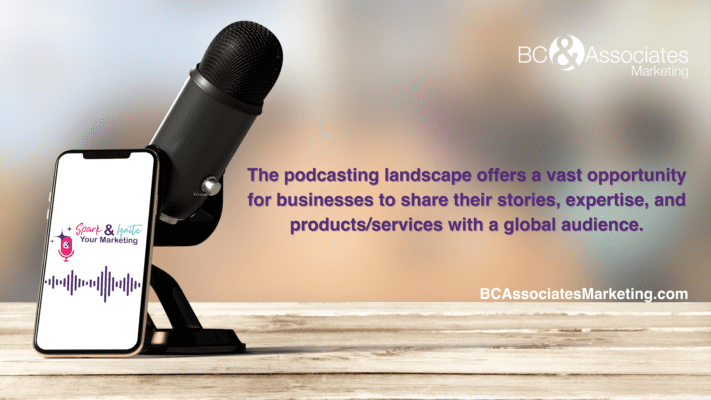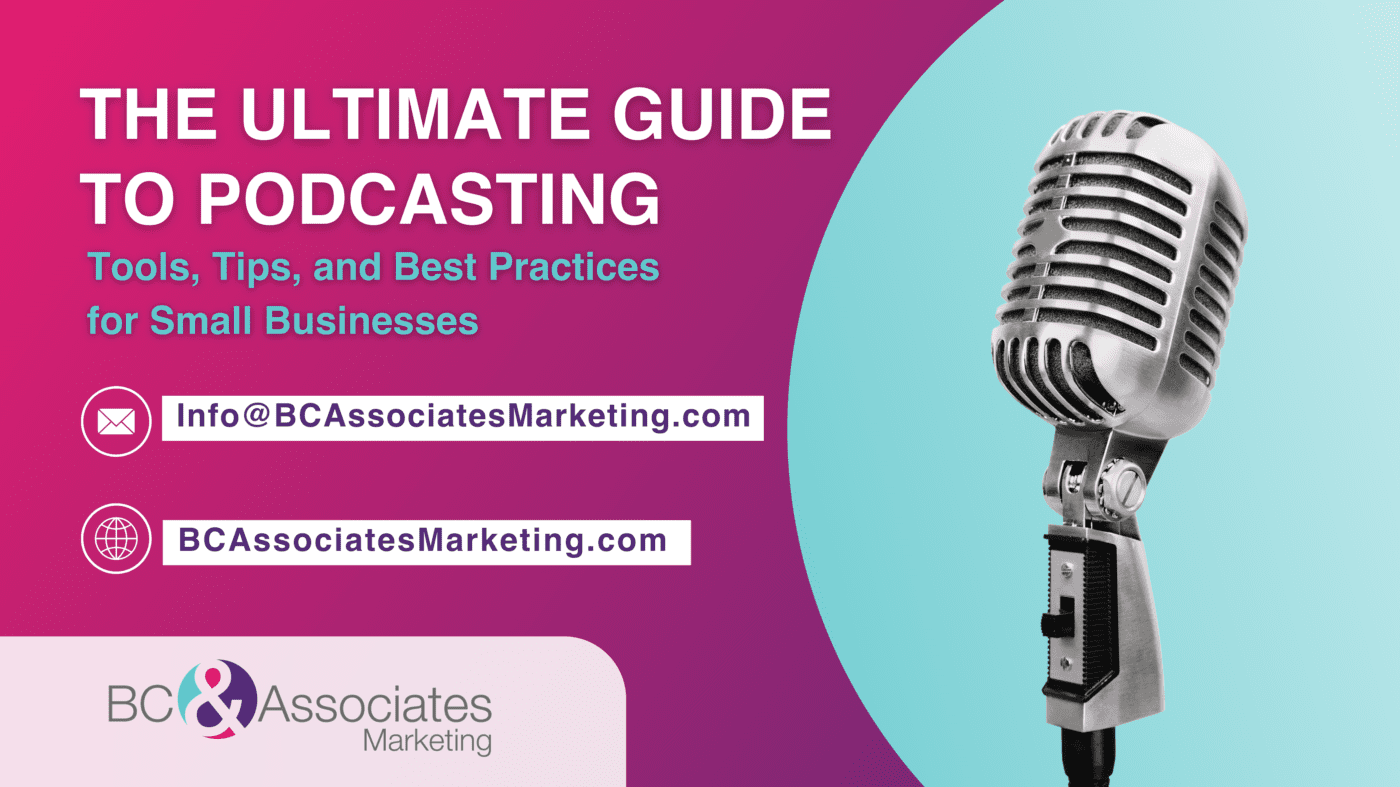Are you ready to join the podcasting revolution and take your small business to the next level? At BC & Associates Marketing, we’re here to help you unlock the power of podcasting with our ultimate guide. From choosing your format and the right tools to implementing best practices, we’ve got you covered every step. So, let’s dive in and explore how you can leverage podcasting to ignite your marketing efforts and reach new heights of success!
Why Podcasting Matters for Small Businesses
Podcasting has become a powerful tool for small businesses to connect with their audience more intimately and engagingly. With over 1.75 million podcasts and 43 million episodes available worldwide, the podcasting landscape offers a vast opportunity for businesses to share their stories, expertise, and products/services with a global audience. Also, according to Edison Research, 37% of Americans aged 12 and older listen to podcasts monthly, highlighting this medium’s growing popularity and reach. Incorporating podcasting into your marketing strategy can amplify your brand’s visibility, establish thought leadership, and foster deeper connections with your target audience.

Exploring Podcasting Formats
When diving into the world of podcasting, understanding the different formats available can help you tailor your content to your target audience and achieve your podcasting goals. Here are some popular podcasting formats to consider:
1. Interview Podcasts:
This format involves hosting interviews with guests, experts, or influencers within your niche. It’s an excellent way to provide valuable insights to your audience while leveraging the credibility and authority of your guests.When it comes to podcasting, inviting guests to share their expertise and insights can take your episodes to the next level. However, it’s essential to approach guest applications and agreements with professionalism and clarity to ensure a smooth and successful collaboration. Here are some key considerations to keep in mind:
-
Guest Application Process:
- Establishing a structured guest application process is crucial for vetting potential guests and ensuring they align with your podcast’s themes and audience. Create a guest application form that collects essential information such as the guest’s name, contact details, areas of expertise, and proposed topics for discussion. This will help you evaluate whether the guest is a good fit for your podcast and streamline the booking process.
-
Clear Guest Agreement:
- Once you’ve selected a guest for your podcast, it’s important to outline the terms of the collaboration in a clear and comprehensive guest agreement. This agreement should include details such as the date and time of the interview, the topics to be discussed, the duration of the episode, and any promotional activities or endorsements agreed upon. Be sure to include clauses covering intellectual property rights, confidentiality, and other relevant legal considerations to protect both parties’ interests.
-
Communication and Preparation:
- Before the interview, communicate with your guest to discuss the logistics of the recording, provide them with guidelines or talking points for the episode, and address any questions or concerns they may have. Encourage your guests to prepare adequately by researching your podcast and familiarizing themselves with your audience and discussion topics. Clear communication and preparation ensure a smooth and engaging interview experience for you and your guest.
-
Promotion and Cross-Promotion:
- After the episode is recorded, collaborate with your guest to promote the episode across your respective channels, including social media, email newsletters, and websites. Consider creating custom graphics or audiograms to share snippets of the episode on social media platforms and engage your audience. Additionally, explore opportunities for cross-promotion by appearing on your guest’s podcast or inviting them to contribute to future podcast episodes.
-
Feedback and Follow-Up:
- Finally, solicit feedback from your guest after the published episode to assess their experience and gather insights for improvement. Thank them for their participation, and consider sending a follow-up email with links to the episode and any relevant resources discussed during the interview. Building strong relationships with your guests through clear communication, professionalism, and mutual respect will contribute to the success and longevity of your podcast.
By implementing these tips for guest applications and agreements, you can elevate your podcasting game and create compelling episodes that resonate with your audience and guests alike.
2. Solo Podcasts:
The host presents the content alone in a solo podcast without guest speakers. Consequently, this format allows for deep dives into specific topics, personal storytelling, and establishing a strong connection with the audience.
3. Panel Discussions:
Panel discussions involve multiple hosts or guests discussing various topics, sharing diverse perspectives, and engaging in conversations. This format fosters lively discussions and debates, making it ideal for informative and entertaining content.
4. Narrative or Storytelling Podcasts:
Narrative podcasts focus on storytelling, often featuring scripted content, fictional stories, or true crime narratives. This format captivates listeners with compelling storytelling, engaging plotlines, and immersive audio experiences.
5. Educational or How-To Podcasts:
Educational podcasts provide listeners valuable information, tips, and tutorials on specific subjects or skills. Whether it’s learning a new language, mastering cooking techniques, or exploring digital marketing strategies, educational podcasts cater to audiences seeking practical knowledge and guidance.
6. Roundtable Discussions:
Like panel discussions, roundtable discussions involve multiple hosts or guests engaging in conversations on a particular topic. However, roundtable discussions typically have a more casual and informal tone, encouraging organic conversations and spontaneous interactions.
7. News and Current Events:
Podcasts focusing on news and current events provide listeners with up-to-date information, analysis, and commentary on the latest happenings across various industries, politics, entertainment, and more. This approach ensures that audiences stay informed and engaged with the world around them.
8. Branded Podcasts:
Businesses create branded podcasts to promote their brand, products, or services. They often feature storytelling, interviews, and valuable content tailored to the brand’s target audience, enhancing brand awareness and engagement.
9. Comedy and Entertainment:
Comedy and entertainment podcasts aim to entertain listeners through humor, satire, storytelling, and comedic performances. As a result, this format offers lighthearted content and a break from everyday life, appealing to audiences seeking entertainment and laughter.
10. Hybrid Formats:
Many podcasts combine elements of multiple formats to create a unique and engaging listening experience. Whether mixing interviews with storytelling, combining educational content with panel discussions, or blending humor with educational segments, hybrid formats offer versatility and creativity in podcasting content.
By exploring these different podcasting formats, you can choose the one that best aligns with your content goals, target audience, and unique style as a podcast host. Whether you aim to inform, entertain, inspire, or engage your listeners, selecting the right format lays the foundation for a successful podcasting journey.
Best Podcasting Tools
When it comes to launching a successful podcast, having the right tools is crucial. From recording and editing software to hosting platforms and distribution channels, numerous tools are available to help you easily create and distribute your podcast. Some popular podcasting tools include:
- Recording and Editing Software: Programs like Adobe Audition, GarageBand, and Audacity offer powerful editing features to enhance the quality of your audio recordings. We have also used Riverside, Restream, Zoom, and Streamyard to record podcasts. We love Descript’s integration with various tools for editing. So many options!
- Microphones: Invest in a high-quality microphone to ensure clear and professional-sounding audio. Options like the Blue Yeti, Audio-Technica AT2020, and Rode NT-USB are popular among podcasters.
- Hosting Platforms: Platforms like Libsyn, Podbean, and Buzzsprout provide hosting services to store and distribute your podcast episodes across various podcast directories, including Apple Podcasts, Spotify, and Google Podcasts.
- Remote Recording Tools: Tools like Zencastr, SquadCast, and Riverside. fm allows you to record remote interviews with guests from anywhere worldwide, ensuring seamless audio quality and minimal technical glitches.
- Transcription Services: Services like Rev and Otter.ai offer transcription services to convert your podcast episodes into written text. As a result, it makes them more accessible to a wider audience and improves search engine visibility.
Best Practices for Launching Your Podcast
Launching a successful podcast requires careful planning and execution. Here are some best practices to keep in mind:
- Define Your Audience and Content: Identify your target audience and create content that resonates with their interests, needs, and pain points. Consider conducting market research and audience surveys to gain insights into their preferences and preferences.
- Create a Compelling Brand Identity: Develop a strong brand identity for your podcast, including a memorable name, eye-catching logo, and consistent visual branding across all platforms. Your brand identity should reflect your podcast’s unique value proposition and resonate with your target audience.
- Plan Your Episodes: Create a content calendar outlining your podcast episodes, topics, and guests in advance. This will help you stay organized and ensure a consistent publishing schedule to keep your audience engaged.
- Promote Your Podcast: Utilize social media, email marketing, and other digital channels to promote your podcast and reach a wider audience. Consider collaborating with influencers, guest podcasting on other shows, and running paid advertising campaigns to increase visibility.
- Engage with Your Audience: Encourage listener feedback, comments, and reviews to foster community and engagement around your podcast. Respond to listener inquiries, address their questions, and incorporate their feedback into future episodes to create a more interactive and dynamic listening experience
Helpful Links
- The evolution of podcasting, the latest trends, and innovative ways to harness the power of podcasts in your marketing. – Podcasting in Marketing
- Spark and Ignite Your Marketing Podcast
- Get the Ultimate Podcasting Pack
Need a Podcast Partner?
At BC & Associates Marketing, we’re passionate about helping small business entrepreneurs like you navigate the exciting world of podcasting and harness its full potential for growth and success. From choosing the right tools to implementing best practices and staying ahead of key industry trends, we’re here to support you every step of the way. Therefore, don’t miss out on the opportunity to spark your unique opportunities and ignite your marketing with podcasting. Schedule a complimentary 15-minute fit call with us today, and let’s embark on this podcasting journey together!
Don’t forget to tune into our “Spark & Ignite Your Marketing” podcast. Subscribe to our podcast on your favorite podcast app at Buzzsprout and ensure you’re always in the loop. Packed with key marketing principles, expert insights, and discussions on the trends that will spark and ignite your marketing and help you succeed.
Additional Resources to Aid Your Marketing Journey
- The Complete A-Z Guide to Branding and Marketing Acronyms for Service-Based Businesses
- The Ultimate Guide to Building a Strong Service-Based Brand
- How to Create an Effective Digital Marketing Strategy for Service-Based Businesses
- The Power of Storytelling in Marketing Your Service-Based Business
- SEO Best Practices for Service-Based Businesses: Improve Search Rankings and Increase Organic Traffic


